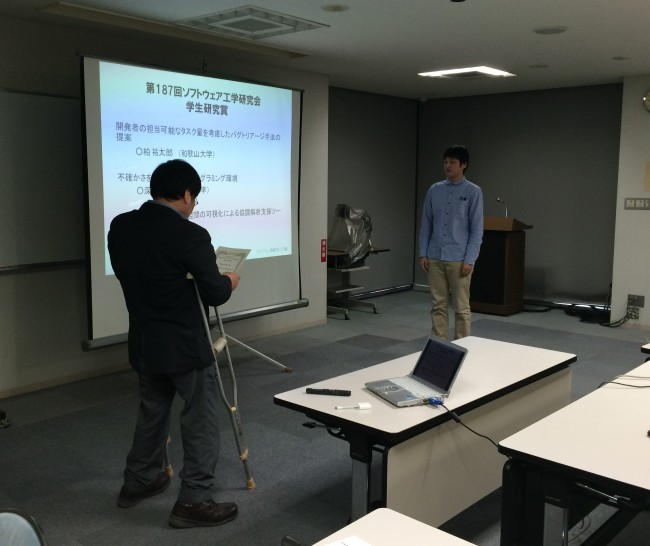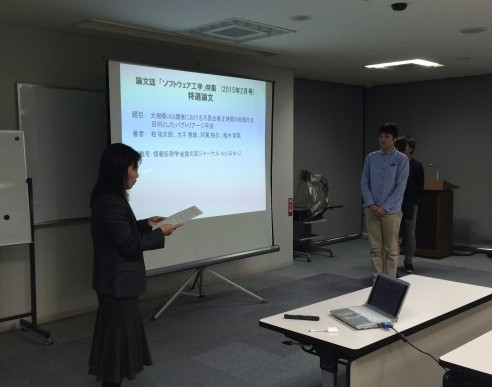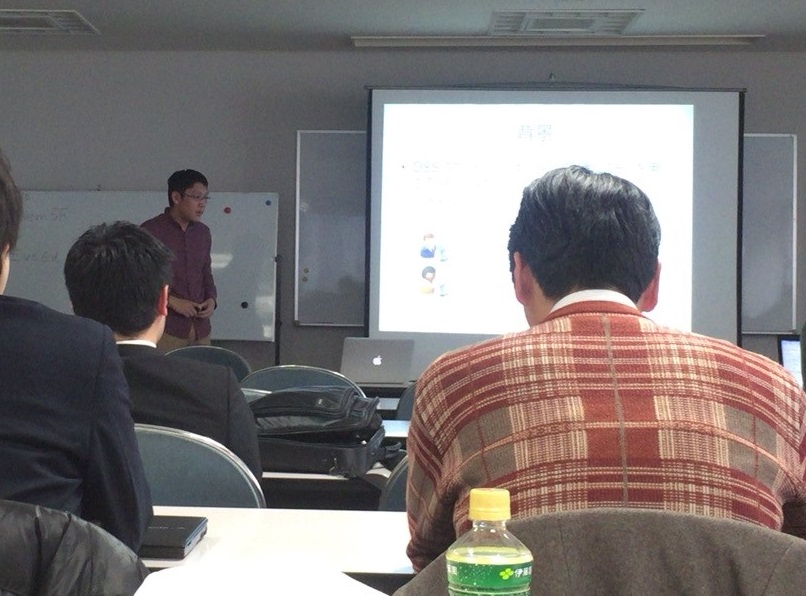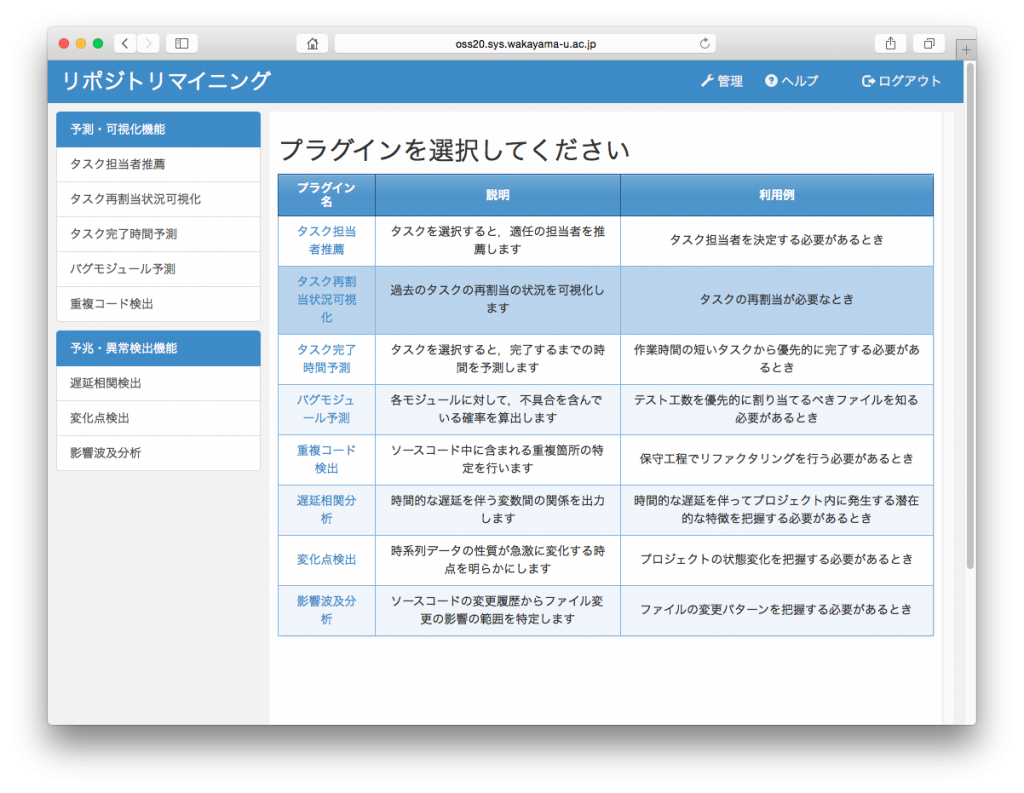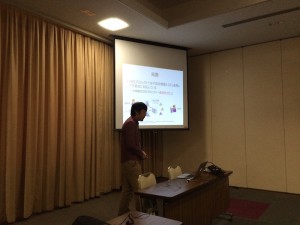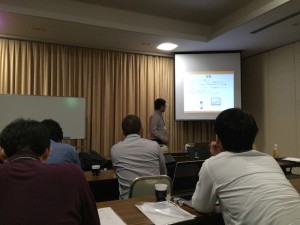毎年恒例の花見大会を和歌山城でおこないました!
学長表彰
学生研究賞受賞
情報処理学会論文誌ジャーナル/JIP特選論文表彰式
特選論文に選定された論文,『大規模OSS開発における不具合修正時間の短縮化を目的としたバグトリアージ手法』の表彰式が行われました!
第187回ソフトウェア工学研究発表会
High Impact Bug Dataset
Background and Motivation
Since increasing complexity and scale of modern software products imposes tight scheduling and resource allocations on software development projects, a project manager must carefully triage bugs to determine which bug should be necessarily fixed before shipping. Although in the field of Mining Software Repositories (MSR) there are many promising approaches to predicting, localizing, and triaging bugs, most of them do not consider impacts of each bug on users and developers but rather treat all bugs with equal weighting, excepting a few studies on high impact bugs including security, performance, blocking, and so forth. To make MSR techniques more actionable and effective in practice, we need deeper understandings of high impact bugs. In order to more precisely capture characteristics and consequences of high impact bugs, we collected 4,000 issue reports from four open source projects and tagged six types of high impact bugs on the collected issues by reviewing them manually.
Dataset
You can download our dataset of high impact bags collected from the Apache Ambari, Camel, Derby, and Wicket projects. The dataset includes not only the information of issue reports but also the information of labels of high impact bugs: surprise, dormant, blocking, performance, security, and breakage bugs.
-
dataset (2.3MB, all data are included in MS-Excel FORMAT)
-
ambari (0.7MB, ambari project’s data in csv FORMAT)
-
camel (1.8MB, camel project’s data in csv FORMAT)
-
derby (1.8MB, derby PROJECT’S DATA IN CSV FORMAT)
-
wicket (1.4MB, wicket project’s data IN csv FORMAT)
Contributors:
Wakayama University, Japan
- Yutaro Kashiwa (graduate student)
- Yosuke Yamatani (graduate student)
- Hayato Yoshiyuki (graduate student)
- Yoshiya Maeda (graduate student)
- Masao Ohira (associate professor)
Nara Institute of Science and Technology, Japan
- Nachai Limsettho (graduate student)
- Keisuke Fujino (graduate student)
- Hideaki Hata (assistant professor)
- Akinori Ihara (assistant professor)
- Kenichi Matsumoto (professor)
Related publications:
- Masao Ohira, Yutaro Kashiwa, Yosuke Yamatani, Hayato Yoshiyuki, Yoshiya Maeda, Nachai Limsettho, Keisuke Fujino, Hideaki Hata, Akinori Ihara and Kenichi Matsumoto, “A Dataset of High Impact Bugs: Manually-Classified Issue Reports”, In Proceedings, of The 12th Working Conference on Mining Software Repositories, 2015. (To appear) [Poster]
- Yutaro Kashiwa, Hayato Yoshiyuki, Yusuke Kukita, and Masao Ohira, “A Pilot Study of Diversity in High Impact Bugs,” In Proceedings of 30th International Conference on Software Maintenance and Evolution (ICSME2014), pages 536–540, 2014.
Contact:
Feel free to contact us If you find any problems with our dataset.
ossxx@xxml.sys.wakayama-u.ac.jp
リポジトリマイニング支援環境の公開
定量的プロジェクト管理ツールIPA EPM-Xの機能拡張のためのリポジトリマイニング支援環境を公開しました!こちらのサイトで公開しています.
大規模OSS開発における不具合修正時間の短縮化を目的としたバグトリアージ手法
愛媛大学と九州大学との共同研究「大規模OSS開発における不具合修正時間の短縮化を目的としたバグトリアージ手法(柏祐太郎,大平雅雄,阿萬裕久,亀井靖高)」が情報処理学会論文誌の特選論文として掲載されました!
@article{Kashiwa2015,
title = {大規模OSS開発における不具合修正時間の短縮化を目的としたバグトリアージ手法},
author = {柏 祐太郎 and 大平 雅雄 and 阿萬 裕久 and 亀井 靖高},
journal = {情報処理学会論文誌},
volume = {56},
number = {2},
pages = {669--681},
month = {2},
year = {2015},
}
WWS2015 in 宜野湾
情報処理学会ソフトウェア工学研究会主催のウインターワークショップ2015・イン・宜野湾にて研究発表を行いました!
- 不具合修正における優先度と修正作業の関係理解のための分析(吉行 勇人,大平 雅雄)
- 変化点検出とトピック分析を用いたリポジトリマイニング手法の提案(久木田 雄亮,大平 雅雄)
- High Impact Bug が与える影響の分析に向けて(柏 祐太郎,吉行 勇人,大平 雅雄)
- プロジェクト管理ツールIPA EPM-Xの機能拡張によるリポジトリマイニング研究基盤の構築(大平 雅雄,柏 祐太郎,松本 明,山谷 陽亮,吉行 勇人)
OSSシステムとコミュニティの共進化の理解を目的としたデータマイニング手法
奈良先端大学との共同研究の成果をまとめた論文「OSSシステムとコミュニティの共進化の理解を目的としたデータマイニング手法(山谷 陽亮,大平 雅雄,Passakorn Phannachitta,伊原 彰紀)」が,グループウェアとネットワークサービス研究会(SIGGN)の推薦論文として情報処理学会論文誌に掲載されました!
@article{Yamatani2015,
title = {OSSシステムとコミュニティの共進化の理解を目的としたデータマイニング手法},
author = {山谷 陽亮 and 大平 雅雄 and Passakorn Phannachitta and 伊原 彰紀},
journal = {情報処理学会論文誌},
volume = {56},
number = {1},
pages = {59--71},
month = {1},
year = {2015},
}



